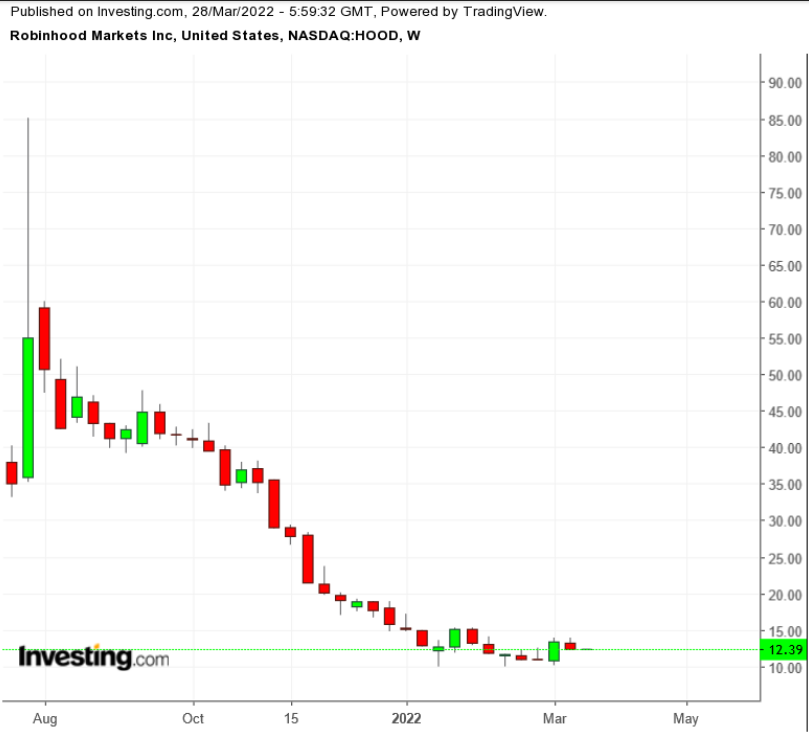Financial services platform Robinhood Markets (NASDAQ:HOOD), known for its popularity with retail investors, is turning out to be one of the worst high-profile market debuts since the onset of the pandemic.

The retail brokerage has plunged 67% since its July initial public offering, when it opened at $38. It has also dropped 83% from its $70.30 record high reached in early August. Shares closed on Friday at $12.39.
The above statistics make the stock one of the worst performers among companies that raised $2 billion or more on global exchanges since early 2020. HOOD currently has a market capitalization of just $10.35 billion.
The Menlo Park, California-based stock trading app became hugely popular among retail investors who were buying and selling meme stocks and cryptocurrencies, after COVID-19 hit, forcing governments to release trillions of dollars in cash assistance to unemployed and struggling businesses.
But that money has dried up with many countries reopening fully, putting an end to fiscal and monetary stimulus. The US Federal Reserve began increasing interest rates this month with additional hikes in store. This central bank tightening has been impacting unprofitable growth stocks—such as Robinhood—the most.
Following the severe sell-off, once high-flying Robinhood is actually valued at lower multiples compared to more mature brokerage rivals. For example, HOOD trades at just a little over 6x projected 2022 revenues, below larger rivals Charles Schwab (NYSE:SCHW) stock, for example, which trades at about 23 times year-ahead earnings, and Interactive Brokers (NASDAQ:IBKR) which trades around 19x projected revenues.
In the current environment, with many macroeconomic and geopolitical risks lurking, it’s hard to imagine the return of retail activity that could fuel the kind of subscriber growth the company experienced during the past two years.
Mounting Losses
The Menlo Park, California-based fintech upstart's most recent earnings release showed losses that were worse than analysts’ estimates. The net loss was steeper than anticipated, monthly active users dropped about 8% from the previous quarter and average revenue per user tanked.
Robinhood also said it expects operating expenses, which soared in 2021, to rise 15% to 20% in 2022, excluding compensation costs. At the same time, the amount of money Robinhood collects from users is dropping: average revenue per user decreased 39% to an annualized $64 in the fourth quarter, driven by lower trading volumes per user in options and equities.
If retail trading activity remains subdued, the other path that could bring some value is to transform Robinhood into a company that offers more than stock, options, and cryptocurrency trading. Indeed, it seems HOOD is working in that direction.
The company, which has more than 22.7 million users, last week, launched a new debit card that would allow users to invest their spare change. Through a new cash card, users can round up their change to the nearest dollar and invest it in assets of their choice.
HOOD will also give customers the option to receive paychecks up to two days in advance via direct deposit, a feature also offered by digital payments giant PayPal Holdings (NASDAQ:PYPL).
Users could also choose to automatically invest a portion of their paychecks, Robinhood said. The company also noted these new features would be free of charge.
Analysts on Wall Street, however, have mixed views on the new initiatives, though their tone is cautiously optimistic.
JMP, in a note last week, reiterated Robinhood as market outperform, saying it’s bullish on new product offerings. The note said:
“Robinhood announced the launch of a new debit card that will replace its existing Cash Management product... Bottom line, we are optimistic about the opportunity for Robinhood and encouraged to see the offering rolling out on schedule.”
Goldman Sachs reiterated its neutral rating on Robinhood, saying the stock could be poised for a re-rating.
“With shares trading at just 4x 2023E revenue, we believe the market is concerned about HOOD’s ability to grow the business and scale into profitability. Thus, we believe shares could be poised for a re-rating at some point if HOOD can translate its new product momentum into a return to revenue and user growth, and thus improve line-of-sight to reaching profitability.”
Bottom Line
HOOD stock is certainly cheap when compared with the past summer’s meme frenzy, which fueled a power rally for the shares. Though it’s hard to see that level of activity returning in the short run, the platform continues to have huge appeal among retail investors and its current valuation looks attractive for a long-term holding, especially if it becomes a takeover target.
